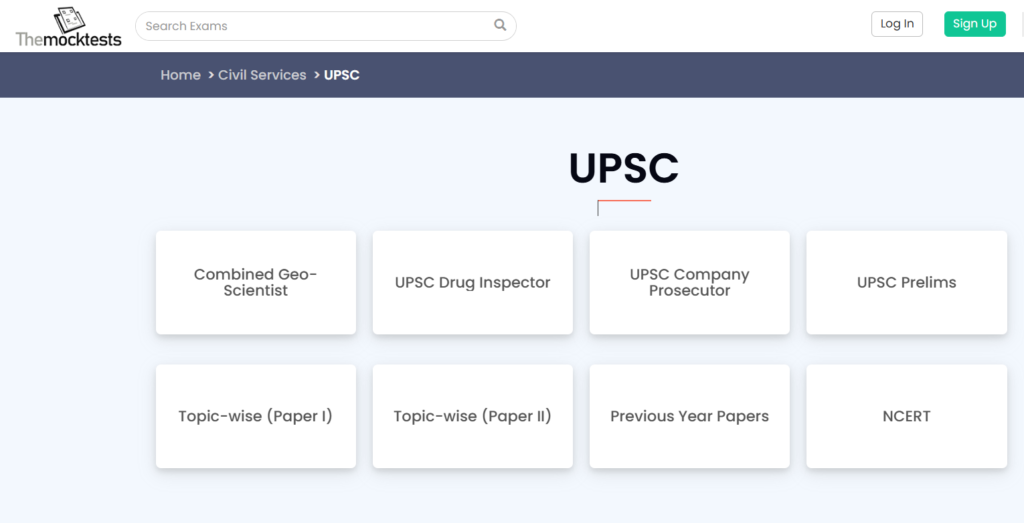The UPSC Civil Services Examination is one of the toughest competitive exams in India. Cracking it requires dedicated preparation, a comprehensive understanding of the syllabus, and a strategic approach. This listicle will break down the UPSC syllabus for general studies in detail, providing a clear roadmap for your preparation.
General Studies Paper 1: Indian Heritage and Culture, History and Geography of the World and Society
- Indian Culture:
- Focus: This section delves into the rich and diverse cultural heritage of India.
- Key Topics:
- Indian Art Forms: Painting, Sculpture, Music, Dance, Architecture
- Philosophy and Thought: Major schools of Indian philosophy, contributions of eminent thinkers
- Literature and Languages of India
- Religions and Philosophies of India
- Preparation Strategy:
- Explore NCERT textbooks from class 6-12 for a foundational understanding.
- Refer to books by renowned authors like Nitin Singhania, Rajiv Ahir.
- Engage with cultural events, visit museums, and watch documentaries to enrich your knowledge.
- History of India:
- Focus: This section covers the entire span of Indian history, from ancient times to the modern era.
- Key Topics:
- Ancient India: Indus Valley Civilization, Vedic Period, Mauryan Empire, Gupta Empire
- Medieval India: Delhi Sultanate, Mughal Empire, Vijayanagara Empire, Bhakti Movement
- Modern India: Indian National Movement, Social and Cultural Reform Movements, Freedom Struggle
- Preparation Strategy:
- NCERT textbooks are essential for this section.
- Refer to standard history books by authors like Bipin Chandra, Spectrum Publications.
- Practice answer writing to develop your analytical and critical thinking skills.
- World History:
- Focus: This section tests your knowledge of significant events and personalities in world history.
- Key Topics:
- Industrial Revolution
- World Wars
- Cold War
- Rise of Nationalism and Colonialism
- Contemporary World History
- Preparation Strategy:
- Refer to world history textbooks and online resources.
- Focus on major events, their causes, and consequences.
- Develop a timeline of significant world events to aid your understanding.
- Geography of the World:
- Focus: This section covers physical, social, and economic geography of the world.
- Key Topics:
- Distribution of natural resources
- Climatic patterns
- Major geographical features
- Human geography: population, settlements, urbanization
- Environmental issues: climate change, pollution, deforestation
- Preparation Strategy:
- Utilize atlases, maps, and online resources like Google Earth to visualize geographical concepts.
- Refer to NCERT textbooks and standard geography books.
- Stay updated on current environmental issues and global developments.
- Society:
- Focus: This section examines social issues and challenges facing Indian society.
- Key Topics:
- Social stratification
- Caste system
- Gender issues
- Poverty and inequality
- Social movements
- Urbanization and its impact
- Preparation Strategy:
- Read newspapers, magazines, and government reports to stay updated on current social issues.
- Analyze social data and statistics to understand the nuances of social problems.
- Engage in discussions and debates on social issues to develop critical thinking.
General Studies Paper 2: Governance, Constitution, Polity, Social Justice and International Relations
- Governance, Constitution, Polity:
- Focus: This section covers the Indian Constitution, political system, and governance structures.
- Key Topics:
- Indian Constitution: Features, Amendments, Fundamental Rights and Duties
- Union-State relations
- Parliament and State Legislatures
- Judiciary and its role
- Panchayati Raj and Municipal Administration
- Public Policy and its implementation
- Preparation Strategy:
- Thoroughly study the Indian Constitution.
- Refer to books by M. Laxmikanth and D.D. Basu.
- Follow current affairs related to governance and political developments.
- Analyze government policies and their impact.
- Social Justice and International Relations:
- Focus: This section covers issues related to social justice and India’s foreign policy.
- Key Topics:
- Social justice issues: poverty, inequality, discrimination, human rights
- Welfare schemes and social sector initiatives
- India’s foreign policy: bilateral and multilateral relations
- International organizations: UN, WTO, etc.
- Contemporary global issues: terrorism, nuclear proliferation, climate change
- Preparation Strategy:
- Read newspapers, magazines, and online resources for current affairs on international relations.
- Refer to books on international relations and foreign policy.
- Analyze India’s role in global affairs and its impact on the world.
General Studies Paper 3: Economy, Technology, Environment, Bio-diversity and Disaster Management
- Economy:
- Focus: This section covers the Indian economy, economic development, and economic reforms.
- Key Topics:
- Indian economy: growth, development, and challenges
- Economic reforms: liberalization, privatization, globalization
- Monetary policy and fiscal policy
- Agriculture, industry, and service sector
- Inflation, unemployment, poverty
- Preparation Strategy:
- Refer to NCERT textbooks and standard economics books.
- Follow economic news and reports in newspapers and financial journals.
- Understand economic concepts and their implications for the Indian economy.
- Technology:
- Focus: This section covers the role of technology in various sectors and its impact on society.
- Key Topics:
- Science and Technology: developments in space, biotechnology, nanotechnology, information technology
- Role of technology in development: e-governance, digital India, artificial intelligence
- Cyber security challenges
- Environmental impact of technology
- Preparation Strategy:
- Follow science and technology news in newspapers and magazines.
- Read about advancements in various fields of technology.
- Understand the ethical and societal implications of technological developments.
- Environment, Ecology, Bio-diversity and Disaster Management:
- Focus: This section covers environmental issues, biodiversity conservation, and disaster management.
- Key Topics:
- Environmental pollution: air, water, soil
- Climate change and its impact
- Conservation of biodiversity: wildlife protection, forest conservation
- Environmental laws and regulations
- Disaster management: natural and man-made disasters, mitigation and preparedness
- Preparation Strategy:
- Refer to NCERT textbooks on environment and ecology.
- Read reports and articles on environmental issues.
- Understand the principles of sustainable development.
- Learn about disaster management strategies and preparedness measures.
General Studies Paper 4: Ethics, Integrity and Aptitude
- Ethics and Human Interface:
- Focus: This section explores ethical principles and their application in public service.
- Key Topics:
- Ethics in public administration
- Probity in governance
- Emotional intelligence
- Attitude: content, structure, function
- Moral values and ethical dilemmas in public life
- Preparation Strategy:
- Refer to books on ethics, integrity, and aptitude.
- Analyze case studies and ethical dilemmas.
- Develop a strong moral compass and ethical reasoning skills.
- Philosophical Basis of Governance:
- Focus: This section examines the philosophical foundations of governance.
- Key Topics:
- Democratic values
- Constitutional values
- Rule of law
- Justice and equity
- Good governance
- Preparation Strategy:
- Study the philosophical underpinnings of the Indian Constitution.
- Analyze the principles of good governance and their application in India.
- Reflect on the ethical dimensions of governance and public service.
- Information Sharing and Transparency in Governance:
- Focus: This section emphasizes the importance of transparency and accountability in governance.
- Key Topics:
- Right to Information (RTI) Act
- Citizen-centric governance
- E-governance initiatives
- Corruption and its prevention
- Preparation Strategy:
- Understand the provisions of the RTI Act and its significance.
- Analyze the role of technology in enhancing transparency and accountability.
- Develop a critical understanding of corruption and its impact on society.
- Public/Private Partnerships – Role of Civil Society:
- Focus: This section explores the role of civil society and public-private partnerships in governance.
- Key Topics:
- Role of NGOs and civil society organizations
- Public-private partnerships (PPPs) in development
- Corporate social responsibility (CSR)
- Citizen participation in governance
- Preparation Strategy:
- Study the role of civil society in India and its contributions to social development.
- Analyze the advantages and disadvantages of PPPs.
- Understand the role of CSR in promoting sustainable development.
- Probity in Governance:
- Focus: This section emphasizes the importance of probity and integrity in public service.
- Key Topics:
- Corruption and its prevention
- Ethical conduct and behavior
- Accountability and transparency
- Conflict of interest
- Preparation Strategy:
- Develop a strong understanding of ethical principles and their application in public life.
- Analyze case studies on corruption and its impact.
- Develop strategies for preventing and combating corruption.
UPSC Syllabus For General Studies in PDF Format
Click here to download syllabus in PDF format.
Tips for Effective UPSC General Studies Preparation:
- Develop a Comprehensive Study Plan:
- Allocate adequate time for each section of the syllabus.
- Create a realistic and achievable study schedule.
- Regularly review and revise your study plan.
- Focus on Conceptual Understanding:
- Don’t just memorize facts; strive to understand the underlying concepts.
- Connect different topics and build a holistic understanding.
- Develop analytical and critical thinking skills.
- Current Affairs are Crucial:
- Stay updated on current affairs through newspapers, magazines, and online resources.
- Analyze current events in the context of the UPSC syllabus.
- Practice answer writing based on current issues.
- Practice Answer Writing Regularly:
- Answer writing is a crucial skill for the UPSC exam.
- Practice writing answers to previous year’s question papers.
- Get your answers evaluated by experienced mentors.
- Develop a Strong Foundation:
- Begin with NCERT textbooks to build a strong foundation.
- Gradually progress to more advanced books and resources.
- Refer to standard textbooks and reference books for in-depth understanding.
- Utilize Online Resources:
- Utilize online resources like websites, blogs, and online courses for supplementary learning.
- Engage in online discussions and forums to interact with other aspirants.
- Utilize online platforms for mock tests and practice questions.
- Stay Motivated and Persistent:
- The UPSC journey can be challenging, but staying motivated is crucial.
- Celebrate small victories and learn from your mistakes.
- Maintain a healthy lifestyle and manage stress effectively.

Signup Free For Mock Tests & Previous Year Question Papers
By following these tips and diligently preparing for each section of the UPSC syllabus for general studies, you can increase your chances of success in the UPSC Civil Services Examination. Remember, consistent effort, dedication, and a strategic approach are key to achieving your goal.
Disclaimer: This article provides general information and guidance on the UPSC syllabus for general studies. It is not intended to be a substitute for official UPSC notifications or expert guidance.
FAQs: UPSC Syllabus for General Studies
1. What are the General Studies papers in the UPSC Civil Services Exam?
- The UPSC Civil Services Mains Examination consists of four General Studies (GS) papers:
- GS Paper 1: Indian Heritage and Culture, History and Geography of the World and Society
- GS Paper 2: Governance, Constitution, Polity, Social Justice and International Relations
- GS Paper 3: Economy, Technology, Environment, Bio-diversity and Disaster Management
- GS Paper 4: Ethics, Integrity and Aptitude
2. Where can I find the official UPSC Syllabus for General Studies?
- The official UPSC Syllabus for General Studies can be found on the official UPSC website (upsc.gov.in).
3. How many papers are there in the UPSC Civil Services Exam?
- The UPSC Civil Services Exam has seven papers:
- Two qualifying papers (Indian Language and English)
- One Essay paper
- Four General Studies papers
- Two optional subject papers
4. What is the importance of the General Studies papers in the UPSC exam?
- General Studies papers are crucial as they cover a wide range of topics, testing your knowledge and understanding of various subjects relevant to governance and public administration.
5. How should I prepare for the General Studies papers?
- Develop a Comprehensive Study Plan: Allocate adequate time for each section of the syllabus.
- Focus on Conceptual Understanding: Strive to understand the underlying concepts rather than just memorizing facts.
- Current Affairs are Crucial: Stay updated on current affairs through newspapers, magazines, and online resources.
- Practice Answer Writing Regularly: Practice writing answers to previous year’s question papers.
- Develop a Strong Foundation: Begin with NCERT textbooks and gradually progress to more advanced resources.
- Utilize Online Resources: Utilize online resources like websites, blogs, and online courses.
- Stay Motivated and Persistent: The UPSC journey can be challenging, but staying motivated is crucial.
6. Which books are recommended for General Studies preparation?
- GS Paper 1: NCERT textbooks, Nitin Singhania, Rajiv Ahir
- GS Paper 2: M. Laxmikanth, D.D. Basu
- GS Paper 3: NCERT textbooks, Ramesh Singh, Shankar IAS
- GS Paper 4: Lexicon Publications, Subba Rao
7. How can I improve my answer writing skills for General Studies?
- Practice writing answers to previous year’s question papers.
- Get your answers evaluated by experienced mentors.
- Focus on structure, clarity, and relevance in your answers.
- Analyze model answers to understand the expectations of examiners.
8. What are some common mistakes to avoid in General Studies preparation?
- Not following a structured study plan.
- Neglecting current affairs.
- Over-relying on shortcuts and guesswork.
- Not practicing answer writing regularly.
- Getting discouraged by setbacks.
9. Is coaching necessary for General Studies preparation?
- While coaching can be helpful, self-study and disciplined preparation are equally important.
- Choose a coaching institute wisely and ensure it aligns with your learning style.
10. How can I stay updated on changes in the UPSC Syllabus for General Studies?
- Regularly visit the official UPSC website for the latest notifications and updates.
- Follow reliable news sources and educational websites for updates on the syllabus.
Additional Resources
Helpful Videos
Discover more from ExamQuestIndia: The Best Exam Prep Platform in India
Subscribe to get the latest posts sent to your email.







